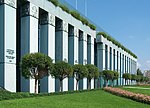Lelewel Palace
Demolished buildings and structures in PolandFormer buildings and structures in PolandHouses completed in 1755Palaces in WarsawRococo architecture in Warsaw

Lelewel Palace (Polish: Pałac Lelewelów) was a rococo palace on the Miodowa Street in the Warsaw Old Town, which was also unofficially named "Palace Street" (ulica Pałacowa). Lelewel Palace was built in 1755 by Efraim Szreger on an estate documented to have been property of King John III Sobieski and maintaining the original Corps de logis. The client and owner until 1787 was Constance Lelewel née Jauch.
Excerpt from the Wikipedia article Lelewel Palace (License: CC BY-SA 3.0, Authors, Images).Lelewel Palace
Miodowa, Warsaw Śródmieście (Warsaw)
Geographical coordinates (GPS) Address Nearby Places Show on map
Geographical coordinates (GPS)
| Latitude | Longitude |
|---|---|
| N 52.2485 ° | E 21.0062 ° |
Address
Miodowa 23
00-246 Warsaw, Śródmieście (Warsaw)
Masovian Voivodeship, Poland
Open on Google Maps











